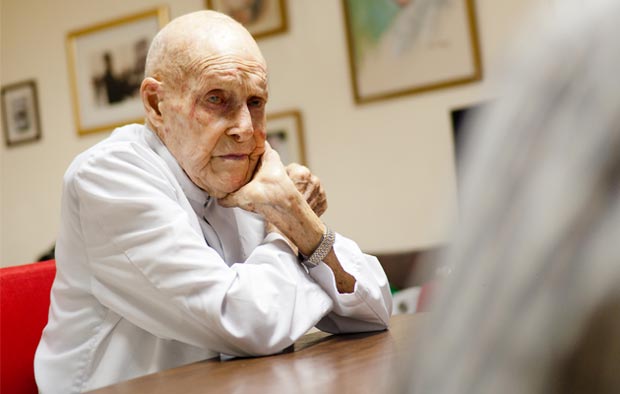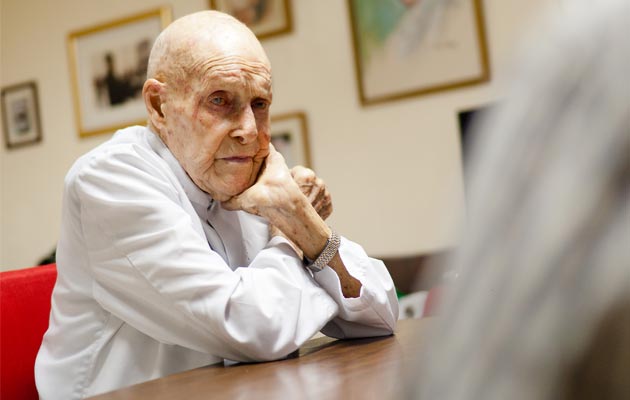
Avoiding contradiction. Fr. James Reuter expressed his objection to professors whose beliefs may be conflicting with the University’s official stand on the RH Bill. Photo by Tim Arafiles.
IF YOU’RE supporting the Reproductive Health Bill, you should not teach in the Ateneo.
Jesuit priest Fr. James Reuter, SJ stirred controversy after making this statement over radio station DZIQ 990, also known as Radyo Inquirer, last May 17. Reuter expressed his opposition to the Responsible Parenthood, Reproductive Health and Population and Development Act of 2011, more commonly known as the Reproductive Health (RH) Bill.
He also denounced the pro-RH Bill professors who teach in the university. His statement touched on the 14 Ateneo professors who released a position paper entitled “Catholics can support the RH Bill in good conscience,” which was released in October 2008. The 14 professors released the paper as their own joint opinion, separate from the university’s official stand. 60 more Ateneo professors later signed a statement of support for the RH Bill.
Ateneo maintains its official stand as being that of the Catholic Church’s, which is opposed to the RH Bill.
Uphold Catholic tradition
Reuter said the current bill is unclear on what exactly it supports. While he admitted that he is no expert on the issue and has not studied the text and the fine print, he insisted that a bill that “admits abortion as a moral thing” is wrong.
“Let me make it crystal clear. When I say RH Bill, I mean it justifies abortion. If it does not justify abortion, then I’m not against it,” he said.
He added that teachers with opinions contradicting Catholic teachings should not teach in a Catholic school like the Ateneo as they will most likely pass it on to students. “If they themselves are convinced that abortion is not murder, they should not be allowed to teach.”
But when asked if he wanted concrete actions on the part of the school, he said that it was up to the administrators’ discretion. A former teacher himself, Reuter said that he would be wary of hiring a teacher who believes in abortion. “You have to be sure that you don’t have a teacher in the Catholic [faith] teaching something contradictory to the Catholic Church. The teachings of the Catholic Church are a body of truth that is crystal clear and you should not teach something contradicting it.”
Reuter, however, is supportive of the bill’s provision on sex education, as long as it is age-appropriate.
Opinions and beliefs
In the radio interview, Reuter also said that the freedom of speech—alluding to the 14 professors’ statement—is not absolute.
Despite his strong reprimand, he clarified that a teacher may believe differently from the Catholic Church, but it should not be presented as a moral truth nor taught to students. He admitted, however, that that would be a difficult thing to do. “You teach what you are,” he said.
While he had a definitive stand about the pro-RH bill professors, Reuter said that students with differing opinions are free to go to the Ateneo. He said that a teacher could eventually influence a student to think otherwise. “The Catholic boy or girl going to a Catholic school would build all their opinions on the truths of the Catholic Church.”
More sympathetic opinions
Not all Jesuit priests share the same hard line stance. Lawyer Fr. Joaquin Bernas, SJ has been more sympathetic towards the RH Bill, although he recognizes the need for more fine-tuning. A member of the commission that drafted the 1987 Constitution, Bernas has presented religious pluralism in the country as a reason for passing the bill, even if he sides with the Church teaching on artificial contraception.
He also decried fellow clergymen who preach that support for RH is an automatic sin, but he has expressed opposition to the compulsory nature of the age-appropriate sex education for schools.
In a memo dated March 24, former university president Fr. Bienvenido Nebres, SJ, said that the university still opposes “the present bill in the light of our Catholic faith.” He does, however, commend the critical thinking and opinion that the debate on the bill has generated.
“We appreciate the efforts of these members of the Ateneo faculty to grapple with serious social issues and to draw from Catholic moral teaching in their study of the bill,” he said. “We recognize the right of our faculty, as individuals, to express their views, and appreciate their clear statement that these views are their own and not that of the University.”
On the other hand, another veteran Jesuit, Fr. John J. Carroll, SJ, expressed his disagreement towards other Philippine bishops who are against the RH Bill. In a commentary written for the Philippine Daily Inquirer, Carroll noted that the bill does not legalize contraceptives, since these are already legal and available in drugstores. He also noted the bill’s categorical opposition to abortion.
Carroll also recommends the further fine-tuning of the bill, particularly on strengthening the ‘conscience clause,’ in which health workers and teachers whose religious values conflict with certain aspects of the bill are protected.
Carroll is the namesake of the John J. Carroll Institute on Church and Social Issues, which is located in the Social Development Complex of the university.







